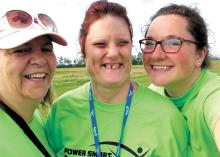When I was first hired as a disability support worker at enVision Community Living in Steinbach, Man., I had no idea what I was doing. I didn’t know many people with intellectual disabilities and I certainly didn’t know what it meant to support someone with intellectual disabilities.
Not only did I have no idea what I was doing, I also had no idea that my life would be so profoundly changed by people with intellectual disabilities.
Like many well-meaning individuals, I came into my role as a disability support worker expecting to be the one helping people with disabilities. I remember in my early days feeling proud of myself for engaging in such a selfless task of helping those I thought to be less fortunate.
What I didn’t expect was that the people I was supposed to be helping were the ones who helped me to see who I really was.
Recently, I tried putting these experiences into words through my master of arts thesis at Canadian Mennonite University (CMU) in Winnipeg. In it I began by combatting traditional understandings of people with intellectual disabilities that work to exclude them from churches and communities. For many individuals who have been raised in modernity, whether we realize it or not, we tend to value individuals for what they can do or what they can bring to a specific setting. Naturally, those with intellectual disabilities are not valued as they often do not meet the traditional western standards of value, such as autonomy, speed and rationality.
As a way beyond these exclusive understandings of personhood, I sought in my thesis to understand people with intellectual disabilities through the method of theological anthropology (understanding who humanity is as beings created by God). To do this, I examined the theological anthropology of Karl Barth.
What makes Barth so appealing for a Mennonite like me is his thoroughly Christocentric approach to theology. For Barth, everything, including our own humanity, must be understood through the person of Jesus Christ. That is because Jesus is the true human, the one who is the fullness of the revelation of God and who shows us how to live. Once we begin to understand who Jesus is, we then begin to understand who we are.
What does it mean for us to understand people with intellectual disabilities through the person of Jesus Christ? That is what I sought to explore in my thesis. What I discovered in Barth’s work was an understanding of the human person that is not grounded primarily on what a person does. Rather, we discover our humanity insofar as we are in relationship with God and with the other. This is because the God who has become incarnate here on earth has determined to be God for us.
For Barth, the purpose of the incarnation was the fulfilment of God’s eternal act of election, the act by which God determined to eternally be God for us. Because of this, the fullness of our humanity can only be achieved insofar as we live into, and participate in, the life of God. The end and purpose of our humanity is to participate in the life of God.
If this seems to be too generic to be a work of disability theology, that is both the point and the problem. It is the point in that a major aspect of my work was to show that people with intellectual disabilities have the same capacity for personhood as those who understand themselves to be able-bodied. It is the problem because people with intellectual disabilities often do have specific and unique needs and challenges that those without disabilities do not possess. We must not overlook this fact in our pursuit of justice and equality.
However, it is my contention that we cannot work for justice and equality on behalf of people with intellectual disabilities if we do not first know them, if we do not first have relationship with them, if we do not become their friends.
I began this piece by stating that when I began my work as a disability support worker, I assumed that I would be the one helping people with intellectual disabilities. Through both my work and my research, I have come to discover that it is actually people with disabilities who help me see who I am. This is because, as Barth says, we cannot truly be people without being in relationship. The individuals I have worked with and become friends with have shown me how to be in relationship and how to welcome and be welcomed.
It is my hope and prayer that members of the body of Christ would continue to welcome and engage with people with intellectual disabilities in our congregations, and that we would learn with and from the valuable place that they hold in our community.
Daniel Rempel, 25, grew up in Niverville, Man. He currently lives in Winnipeg, where he is a student in CMU’s Graduate School of Theology and Ministry.




Add new comment
Canadian Mennonite invites comments and encourages constructive discussion about our content. Actual full names (first and last) are required. Comments are moderated and may be edited. They will not appear online until approved and will be posted during business hours. Some comments may be reproduced in print.